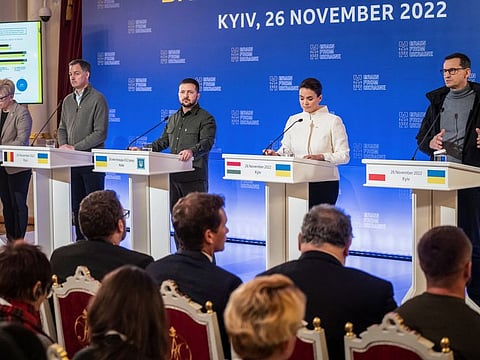Kyiv summit promotes ‘Grain from Ukraine’ for the most vulnerable
Belgium, Lithuania, Poland leaders in Kyiv to commemorate victims of 1932-33 Holodomor

KYIV, Ukraine: Ukrainian President Volodymyr Zelensky hosted a summit in Kyiv on Saturday to promote its “Grain from Ukraine” initiative to export grain to countries most vulnerable to famine and drought.
The Ukrainian leader said the plan demonstrated that global food security was “not just empty words” for Kyiv. The Kremlin has said that Ukraine’s Black Sea exports during the war have not been reaching the most vulnerable countries.
Zelensky said Kyiv had raised around $150 million from more than 20 countries and the European Union to export grain to countries including Ethiopia, Sudan, South Sudan, Somalia and Yemen.
“We plan to send at least 60 vessels from Ukrainian ports to countries that most face the threat of famine and drought,” Zelenskiy told the gathering.
The summit was attended in-person by the prime ministers of Belgium, Poland and Lithuania and the president of Hungary.
Germany and France’s presidents and the head of the European Commission delivered speeches shown by video.
Announced by Kyiv earlier this month, the initiative is in addition to a UN-brokered deal that has allowed some Ukrainian grain shipments through the Black Sea, a vital route for the major wheat producer’s exports that had been blocked.
Flanked by his chief of staff and prime minister on Saturday, Zelenskiy said the Grain from Ukraine initiative aimed to demonstrate that for Kyiv global food security is “not just empty words”.
This will be one of the biggest contributions to global stability a real and very necessary step” he said.
Zelensky also vowed on Saturday that Ukraine would continue to resist Russian attacks, as the country marked the 90th anniversary of the Holodomor famine that affected millions of Ukrainians under Soviet leader Joseph Stalin.
“Ukrainians went through very terrible things... Once they wanted to destroy us with hunger, now - with darkness and cold,” Zelensky said in a video posted on social media.
“We cannot be broken,” he added.
The Polish and Lithuanian prime ministers were in Ukraine for talks that, according to local media, could in particular focus on a possible new wave of migration from Ukraine this winter.
Ukraine’s Border Guard Service said Polish Prime Minister Mateusz Morawiecki was in Kyiv and “honoured the memory of the Holodomor victims” at a memorial in the Ukrainian capital.
Belgium’s Prime Minister Alexander De Croo was also in Kyiv on his first visit since Russia launched attacks.
“Arrived in Kyiv. After the heavy bombing of recent days, we stand with the people of Ukraine. More than ever before,” he said on Twitter, posting photos of him shaking hands with Zelensky.
According to the Belga news agency, Belgium pledged a further 37.4 million euros ($39 million) of financial aid for Ukraine.
‘History repeating itself’
German Chancellor Olaf Scholz and French President Emmanuel Macron announced in video statements new financial aid packages to support Ukrainian grain exports, which have been disrupted by the war.
“The most vulnerable countries must not pay the price of a war they did not want,” Macron said in his statement.
Lawmakers from Germany are set to recognise the Holodomor as “genocide”, according to a draft text of a joint resolution from Germany’s ruling coalition and the opposition seen by AFP.
The German resolution says that up to 3.5 million people are believed to have died that winter alone but historians put the total death toll as high as 10 million.
At the tall candle-shaped Holodomor memorial centre in central Kyiv, a dozen Orthodox priests in black and silver robes gathered on Saturday for a religious ceremony for the victims of the famine.
“It was an artificial genocidal famine... Now when we experience this massive unprovoked war of Russia against Ukraine, we see history repeating itself,” priest Oleksandr Shmurygin, 38, told AFP.
Among those gathered to commemorate the victims of the famine was 39-year-old lawyer Andryi Savchuk, who spoke of its “irreparable” loss for Ukraine.
“Stalin’s system, the repressive state wanted to destroy Ukraine as a nation. Today we see that the efforts made by Stalin are continued by (President Vladimir Putin,” he said.
The Holodomor has long been a source of hostility between Russia and Ukraine.
Russian contests the genocide designation, placing the events in the broader context of famines that devastated regions of Central Asia and Russia.



